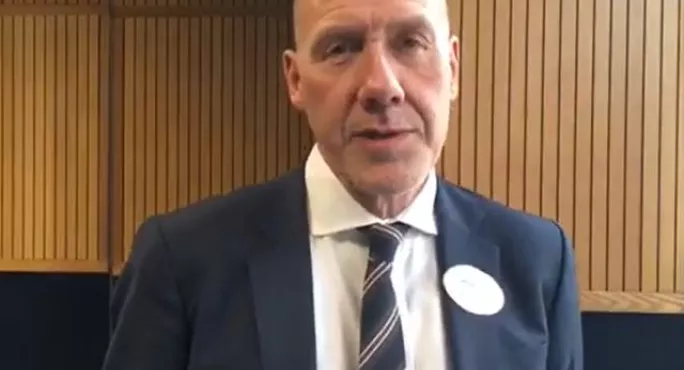Stop ‘tinkering’ and fix Covid crisis gap, say heads

Education secretary Gavin Williamson is offering “thin gruel” in his attempt to improve behaviour and discipline in schools, headteachers said today.
The government is also “obsessed with the narrow idea” that strengthening collaboration between schools has to be done through multi-academy trust expansion, according to headteachers’ leader Geoff Barton.
Responding to the education secretary’s speech at the Confederation of School Trusts’ conference today, the Association of School and College Leaders’ general secretary said: “Perhaps most dispiriting, as we emerge from a national crisis that has further widened the gap between advantaged and disadvantaged children, is that the secretary of state for education thinks that tinkering with structures, issuing surveys and fixating on mobile phones represents any part of the solution.”
Academisation: Schools to get trial runs before joining academy trusts
Multi-academy trusts: Gavin Williamson wants ‘far more schools’ moving into MATs
Covid: Pandemic slows down academy trust growth
Mr Williamson today announced a try-before-you-buy approach to support schools joining MATs and said he wanted schools that are rated as “requires improvement” by Ofsted in three consecutive inspections to be turned into academies.
But Mr Barton warned of the “unintended consequences” of compelling schools to join academies, which could “further stigmatise” them.
Strengthening school collaboration ‘doesn’t have to involve multi-academy trust expansion’
He said: “We support the aim of increasing and strengthening collaboration between schools but we are concerned that the government is obsessed with the narrow idea that this has to be done through MAT expansion.
“The reality is that the government’s policies have created the fragmented system which exists in England and we think that it would be more productive to look in a broader sense at how collaboration and partnership working can be strengthened across all types of schools.
“The try-before-you-buy proposal for schools to partner with a MAT on a trial basis before deciding whether or not to join is a good enough idea, but this already happens informally and we are not sure that the government’s proposals really add up to very much at all.
“We note also a vague intention to bring schools with three consecutive Ofsted judgements of ‘requires improvement’ into MATs and we would caution the government about the unintended consequences of new forms of compulsion, such as further stigmatising schools in this category.”
Mr Williamson used his CST speech to announce plans to run a national behaviour survey in schools, which would take place several times a year in order to “build up a national picture of behaviour over time and act as a signpost to what schools need”.
But Mr Barton said schools were already “very good” at managing behaviour. “The secretary of state is right about the importance of good behaviour and discipline in schools but his solutions of a behaviour survey and encouraging schools to ban mobile phones are thin gruel,” he added.
“The government would be better off reinstating the local support services for struggling families that were lost through its austerity cost-cutting programme and providing sufficient funding to schools for the pastoral support which is so important in preventing behaviour problems from escalating.
“Contrary to what the secretary of state appears to think, schools are actually very good at managing and dealing with challenging behaviour, and they already have robust policies on mobile phones in place.”
However, Leora Cruddas, chief executive of the Confederation of School Trusts said academy trust environments “create the conditions” for better “collaboration among teachers and leaders”:
“There is power in a group of schools working together in a single accountability structure. Multi-academy Trusts (which we call School Trusts) are education charities that run schools to give children a better future.
“As the Education Select Committee said in a report in 2015 on academies and free schools: ‘Primary heads told us that, whilst becoming an academy had improved their practice and their school, this was primarily because of the advantages generated by the collaborative framework of a multi-academy trust.’
School trusts create the conditions for deep collaborations among teachers and leaders to improve the quality of education. They are a new civic structure created with the sole purpose of advancing education for public benefit.
“A group of schools working together in a single entity can do lots of things that are harder for stand-alone schools to do.
Teachers work and learn together to improve the way they teach and schools can share practices that make a difference to the quality of teaching.
Teachers and leaders can work together on the things that matter - like curriculum and assessment. In addition, schools where the quality of education is not yet good enough can be supported to improve.
In the collaborative structure of a School Trust, it is more possible for teachers and leaders to move to another school to help improve the quality of education where that school is struggling - and these moves are more likely to be to schools with more disadvantaged pupils.”
You need a Tes subscription to read this article
Subscribe now to read this article and get other subscriber-only content:
- Unlimited access to all Tes magazine content
- Exclusive subscriber-only stories
- Award-winning email newsletters
Already a subscriber? Log in
You need a subscription to read this article
Subscribe now to read this article and get other subscriber-only content, including:
- Unlimited access to all Tes magazine content
- Exclusive subscriber-only stories
- Award-winning email newsletters



